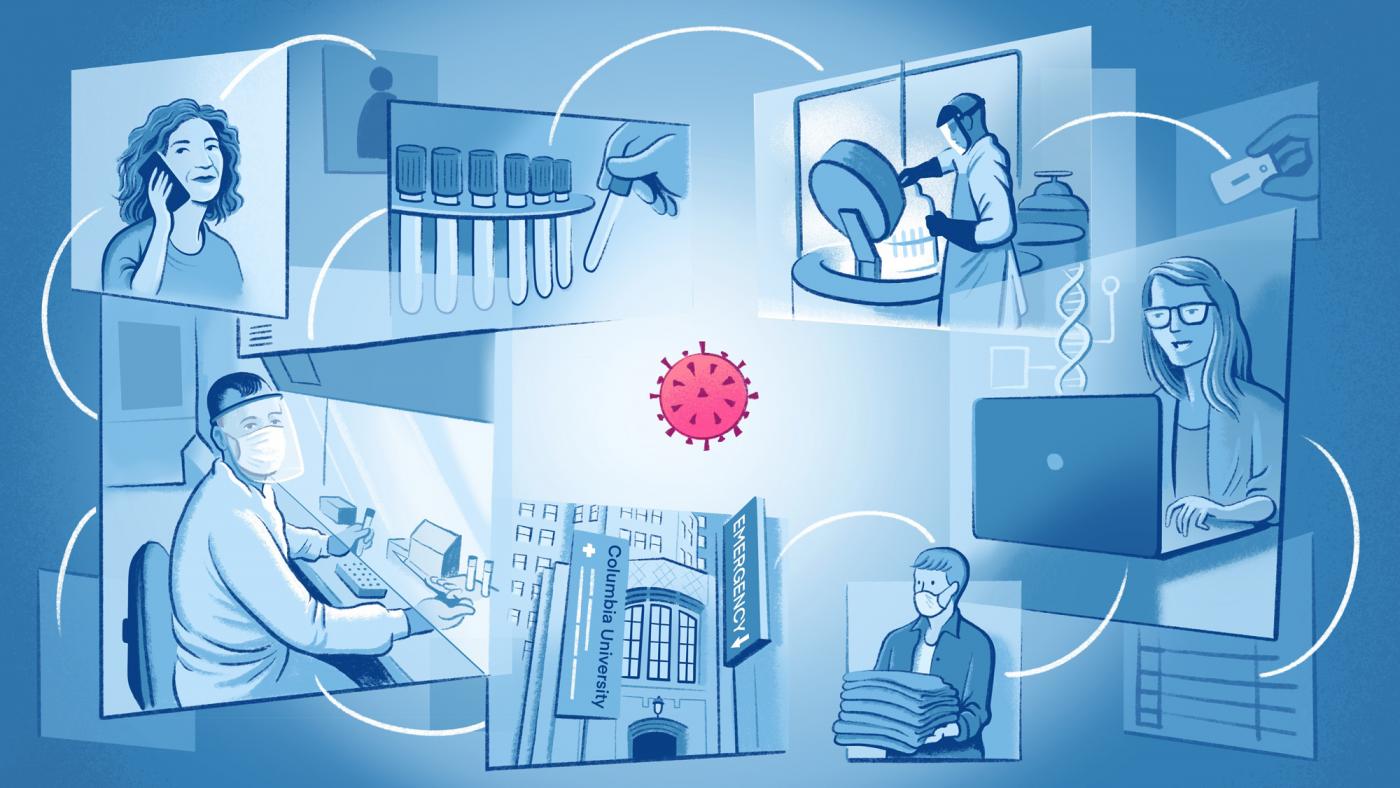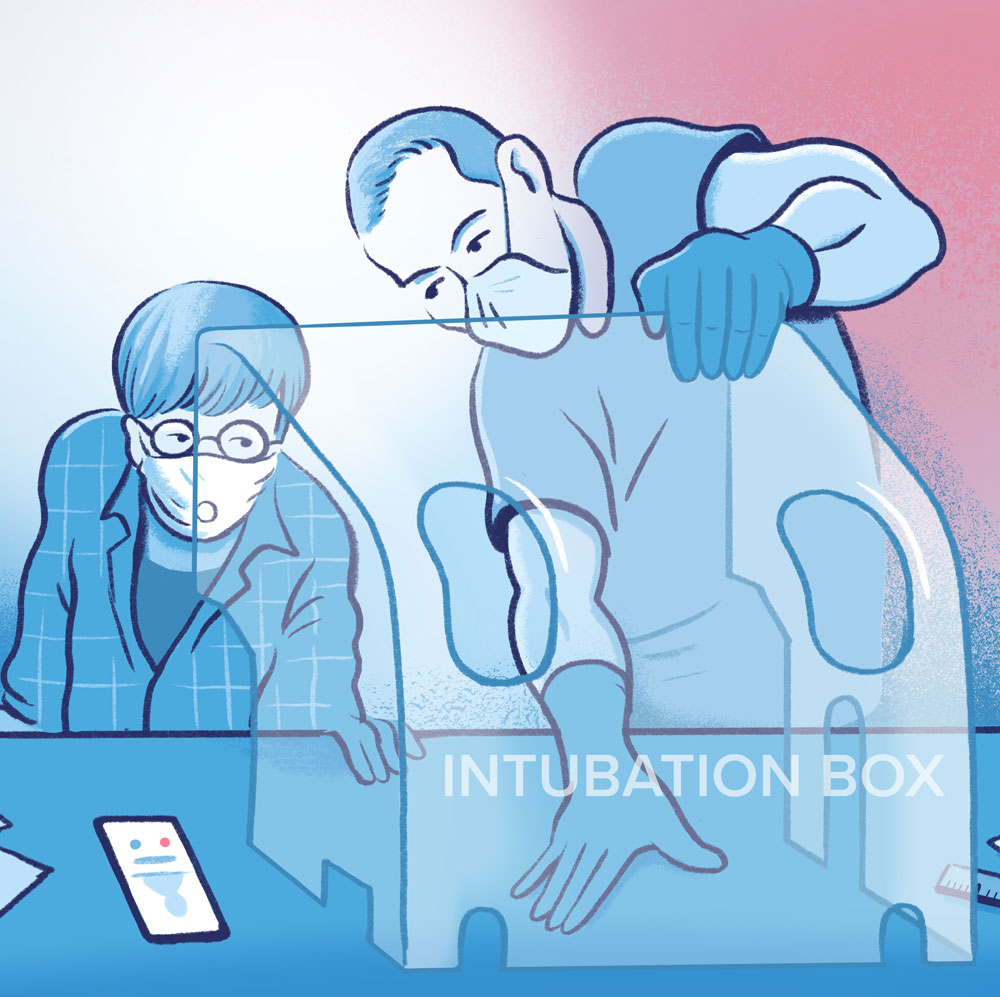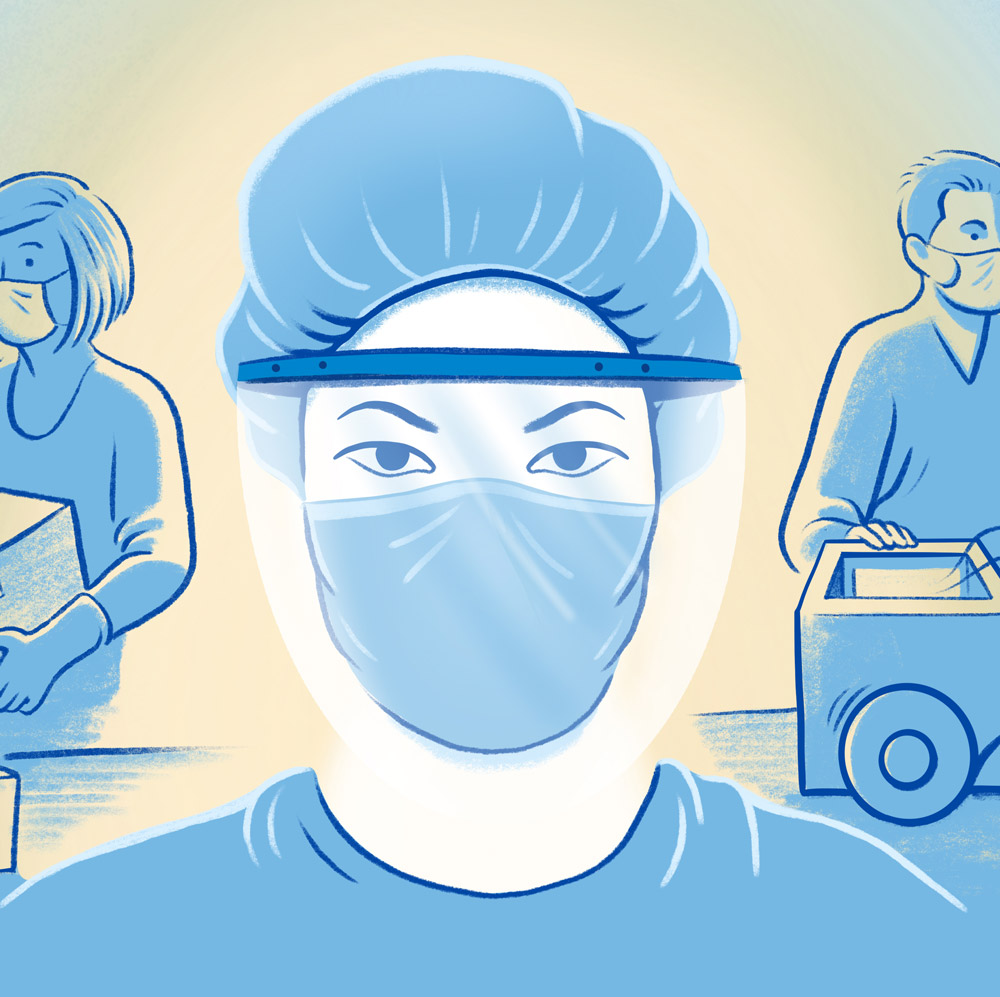KATHLEEN DURKIN I’m Kathleen Durkin of Columbia’s Zuckerman Institute.
DEVIN POWELL And I’m Devin Powell of the Zuckerman Institute.
KATHLEEN Welcome to Lab in the Time of Coronavirus. This podcast follows the lives of brain scientists who are pivoting to combat COVID-19 in this time of crisis. How have you been responding to the pandemic, Devin?
DEVIN Well, we’ve been dragging the keyboard out onto the porch every day to play for the neighborhood. We’re having a neighborhood sing-along. People open up their windows and sing along. We’re trying to keep everyone’s spirits up, out here in San Francisco. How about you? What’s the view from New York?
KATHEEN It’s scary, to be honest. I avoid hospitals. I avoid the subway. I spend a lot of time sanitizing my doorknobs and trying to keep busy. I had some extra time, so I started this podcast with you.
DEVIN Today we’re going to be looking at a group of young researchers at Columbia University Irving Medical Center and at the Zuckerman Institute who wanted to do something. So they started organizing.
KATHLEEN Like a lot of amazing grassroots efforts it began small, with one person, and grew into a movement fueled by hundreds of people in the Columbia community. They’re supporting COVID-related projects across the University: from testing healthcare workers to hosting symposia that foster new scientific collaborations.
My plan was to develop a database of researchers that were willing to volunteer. But I was not thinking of building up an organization like this. I would have never imagined something like this.
DEVIN Before we get to all of those projects, let’s meet Alvaro. He’s a young researcher who had a very personal response to the current pandemic and lit the match that started this 24/7, all-hands-on-deck operation.
ALVARO Being a member of the LGBTQ community, when I heard the word pandemic, this gave me goosebumps. I grew up during the ‘80s, and the AIDS crisis was happening. So this hit close to home, and I felt like I needed to do something.
My name is Alvaro Cuesta-Domínguez. I am an associate research scientist in the lab of Stavroula Kousteni, PhD, associate professor of medical sciences at Columbia’s Department of Physiology and Cellular Biophysics.
KATHLEEN As a researcher who has studied leukemia and other diseases, Alvaro has developed a specialized skill set.
ALVARO I did my first postdoc here in New York in Mount Sinai, where I was also doing HIV research, so I know what pandemics are and I know how much people suffer. I really wanted to help.
DEVIN This desire to help led Alvaro to found Columbia Researchers Against COVID-19. The acronym is CRAC, which turned out to be a great moniker for this crack team led by volunteer postdocs.
ALVARO CRAC started on March 18. At that time, the pandemic was hitting very hard in Europe, and I am from Spain, so I was really monitoring what was going on there. At that time also the World Health Organization was calling for expanding testing in the population. I felt like I could do something, because testing relies on a molecular biology technique that is widely used across the world. My plan was to develop a database of researchers that were willing to volunteer. But I was not thinking of building up an organization like this. I would have never imagined something like this. Right now I believe that we are over 700 members.
DEVIN One of the first people to respond was a postdoc at Columbia’s Zuckerman Institute, a researcher who usually spends her days analyzing complex data to understand how animals make decisions.
KATHLEEN Postdoc is short for postdoctoral researcher. Postdocs are early career researchers, usually in their first or second jobs after getting their doctorate.
NATALIE I’m Natalie Steinemann. I am a postdoc in the lab of Michael Shadlen, MD, PhD, at Columbia’s Zuckerman Institute. Our lab had started to ramp down. I was at home suddenly, and I just couldn’t look away from the rising numbers. So when on that Sunday night I saw the email that just said, “Postdocs relief for COVID, urgent help needed,” I was like “Yes!” And so that is how I became CRAC’s first project manager, where my main qualification was that I replied the fastest. Now I don’t manage my own projects anymore. I’m the Chief Project Manager.
KATHLEEN CRAC doesn’t create projects. Instead it supports needs that have been identified across Columbia University.
KEN OLIVE So the goals of the organization are to interface with the existing Columbia administration experts and basically serve as a matching service.
DEVIN That’s Ken Olive, PhD, associate professor in Columbia’s Department of Medicine, and one of CRAC’s faculty advisors.
KEN Under normal operating circumstances there are all these different units around Columbia that have one or two or three individuals who carry out a function that’s suitable to normal operating needs, but then in the context of the pandemic the whole deck gets shuffled, and now they really have a job that’s ten times as big. And they still have the same number of staff. Meanwhile there’s all these groups of really smart, really motivated individuals who are not able to go into their laboratories or do their daily science, and so the question is can we match those different groups of individuals.
NATALIE Project ideas came floating in from needs that different faculty members or departments had communicated to us. At the moment I believe we’re running between nine and 12 projects.
DEVIN To respond to these requests quickly, the postdocs built out an entire organizational structure and started recruiting. They brought in team leaders to manage each project and other staff members for other needs, like their new Social Media Manager, Chiara.
CHIARA My name is Chiara Bertipaglia. I am the Scientific Program Manager at the Zuckerman Institute. I’ve recently joined CRAC as Social Media Manager. Despite not necessarily having acquired managerial skills by formal training, these researchers are doing what they are great at. They are mustering skills quickly and directly on the field, and they are optimizing processes.
So imagine you have a COVID-related project, and you need a couple of volunteers with very specific skills. By simply inputting a request in the CRAC submission form, then you have a team of people that can take care of that for you. CRAC will contact you and give you the names of volunteers that can help you with that job. The speed at which CRAC is able to help establish and sustain the new COVID-19-related projects is just really fascinating.
KATHLEEN One of the first problems the team tackled was helping the board that reviews clinical trials for drugs, the Institutional Review Board or IRB, to keep track of which trials could continue, in the midst of the pandemic, and which trials needed to be put on pause.
NATALIE It wasn’t certain any more which of these 6,000 clinical trials needed to be changed and which needed to be halted.
DEVIN Then there’s the team that swoops in to help keep labs running with skeleton crews going when something goes wrong.
NATALIE So we have a rapid response team that’s just going to be there as soon as a problem arises.
KATHLEEN There’s a symposium that brings together researchers from diverse backgrounds studying COVID-19. And there are efforts to test healthcare workers, and even to fold protective equipment, uniforms and linens at the hospital.
NATALIE Our volunteers are helping in the linen department with scrubs. There’s suddenly such an increased need for scrubs as well as just bed linen, but they don’t have enough employees.
And then what I think is our most successful project is helping at the COVID Biobank.
DEVIN Run out of the lab of Eldad Hod, MD, associate professor of pathology and cell biology at Columbia University Irving Medical Center, the Biobank collects and stores thousands of samples from COVID-19 patients.
KATHLEEN There are a lot of different kinds of samples in the Biobank. There are those nose swabs that you might have seen people getting on TV. There are also different kinds of blood samples.
DEVIN From his own research, Alvaro has a lot of experience working on samples like these. And he knows how important it is that researchers have access to such samples, so that they can better understand what’s happening inside people who have been exposed to COVID-19.
ALVARO Our motto in the biobank is that no tube gets thrown into the trash. The idea is that we will be collecting samples for as long as this is going on. These samples will help answer many, many questions that we still don’t know about the virus. For example, you could do longitudinal studies to track the viral load in the samples and determine when a patient is contagious and when they are not contagious. You could study what is the effect of the virus in patients that have this kind of disease, or this other kind of disease. Also collecting these samples can enable research on the proinflammatory response that is one of the reasons why the disease is so, so severe.
Both numbers and the experience over the last days tell us that we already peaked a few days ago, and we are seeing a decrease in the volume of samples we receive. And this is a really good thing. It’s something that keeps us hoping.
KATHLEEN This 24/7 approach to starting and running CRAC has made the team members very close in a very short time.
NATALIE I remember during one of the meetings, I think when we introduced a new group or were just introducing a couple of new team members. And we kept talking about Ken. We talked about this to Ken, we talked about that to Ken.
DEVIN Ken is Ken Olive, the faculty advisor we met earlier.
NATALIE And the person was just like, “Oh yeah, you’ve obviously worked with him before all of this started.” We’re like, “No, we’ve known each other for a week.” But you know, if you get to a stage where you’re happy to call someone at 10:30 at night just because you need something …. We’ve never met each other, or most of us never have. But there’s still all of these different questions and problems to work through together. At least on an organizational level, that has brought us very close together.
ALVARO It’s just a bunch of very committed people, super motivated, coming together and working in solidarity. Everyone feels a little bit better in these times where not everyone can feel good.
CHIARA My favorite moments are those moments when I get to witness the ferment and enthusiasm of all of the CRAC team members. I think maybe the clearest example of this was when the request for volunteers to work at the hospital came in. I think it was already in evening time, a day in the middle of the week. We used the Slack channel where we are in contact with each other, and there were hundreds of messages over a period of three hours in the middle of the night where people were just figuring out logistics and getting organized. It was incredible to see how people are committed, dedicated and want to help, genuinely want to help and make a difference.
KATHLEEN Thanks for listening to Lab in the Time of Coronavirus. Take a look at the show notes for links to all the things we discussed. You can find all of our episodes at https://zuckermaninstitute.columbia.edu or on iTunes. Take a moment to rate and review us on iTunes. That makes it easier for other people to find us.
DEVIN And if you’d like to learn more about the CRAC team we interviewed today and their projects, check out their website at http://columbiavid.weebly.com. Special thanks to Rui Costa, Jennifer Farris, the researchers who sat down with us for this episode, and the entire Zuckerman team. The music was provided, as usual, by Miguel Zenón, Jazz Artist-in-Residence at the Zuckerman Institute. If you have thoughts or questions, you can find us on Twitter and Instagram @ZuckermanBrain. But before we go, Kathleen I think you had one last question for the especially international group of researchers we interviewed today, from Germany, Italy and Spain.
KATHLEEN What is the first thing you plan to do, post-pandemic?
CHIARA Take an airplane.
ALVARO Take a flight.
NATALIE International travel.
CHIARA To Rome, in Italy.
ALVARO To Madrid.
NATALIE I’m from Germany. I want to go home.
CHIARA And go see my family.
ALVARO And go see my mom and my friends. I have a relative that went through this and he was in the hospital, so I really need to be with the loved ones. Yeah, I need to go home.
Note: This transcript has been edited for clarity.


